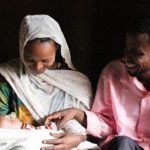Let Girls Learn
As the dust settles form the latest budget shutdown in Washington, some haze still remains around the status of the global Let Girl’s Learn initiative. Let Girls Learn was formally launched by Michelle Obama in 2015 as a partnership across the private sector and several government agencies, including USAID, PEPFAR (the President’s Emergency Plan for AIDS Relief), and Peace Corps. Since then, thousands of Peace Corps Volunteers in 44 countries around the world have built long-term partnerships with local communities to champion girl’s education, support teachers and administrators in rural schools, and empower adolescent girls with the knowledge and tools they need to stay health, fight for their right to a quality education, and become the future leaders our world needs.
The programs that Let Girls Learn support will hopefully stay intact regardless of any financial decisions regarding branding. However, the de-emphasis on the work that Peace Corps and its partners across government and private foundations are doing to empower adolescent girls is a shame. I served as a Peace Corps Volunteer in South Africa from 2006-2008, several years before Let Girls Learn began. Working with community partners to support adolescent girl’s empowerment and education is built into the DNA of Peace Corps – and Peace Corps Volunteers – bu Let Girl’s Learn systematic work to support and celebrate those efforts was a breath of fresh air.
As a Peace Corps volunteer in rural South Africa, I worked with teachers from every school in our village to run an annual girls camp called Likusasa Leftu (Our Future, in Siswati). Each year, 25 6th-9th grade girls, a half-dozen teachers, and three volunteers would take a week out from their lives to eat good food, build friendships, and talk about the future that girls wanted to build. In an area where the HIV prevalence was likely around 30%, and in the days before treatment was widely available for rural South Africans, we talked about how to keep ourselves safe from HIV and what options were available for pregnant women who had contracted the virus and wanted to protect their babies. In a nation where approximately 1 in 7 women had their first child before their 18th birthday – frequently forcing them to drop out of school – we talked about negotiating safe sex, condom use, and what we wanted from our relationships. And in a village and school system that had only recently begun to emerge from the vicious institutionalized inequities of Apartheid and Bantu Education, we talked about our goals for the future, who we wanted to be, and how we would get there. We brought female roles models – police officers and pastors – to challenge notions of what women could and couldn’t be, and we talked about the gender roles that shaped out notions of those possibilities. In one of the most moving experiences of my time as a volunteer, we ended our week by writing down all the things we thought we could not be or do, and then held a three hour funeral for those “I Can’ts,” complete with a sermon, eulogies, congregational singing, and a culminating bonfire where we burnt our limitations to the ground.
Girl’s education is crucial in the fight for gender equity around the world: it delays marriage and childbirth until we are ready, improves economic empowerment, decreases the risk of HIV, and creates better health outcomes for women and our families across the lifespan. Peace Corps Volunteers have been supporting camps like Likusasa Letfu for decades, many of them under the name Camp GLOW (Girls Leading Our World). While we currently have no data on the long-term effects of those efforts, I know that they reach deeply into communities and social networks in a way that few other internationally supported projects can, in large part because their approach relies above all else on partnership, community building, and the outlandish creativity it takes to create a week long sleep-away camp for 35 people with a $600 budget, a pad of flipchart paper, and boundless persistence. We at the Center on Gender Equity and Health have called to build the evidence base on the effectiveness of these efforts in our review of the US Global Strategy to Empower Adolescent Girls – having, what they can change to do even better, and how Peace Corps staff in DC and country offices can better support them in their work to empower girls around the world.
I am still in touch with many of the girls who attended our camps today. And the most common thing they ask me about, when we chat on Facebook or when I am lucky enough to see them in person on infrequent visits back to my community in South Africa, is if I remember our time at camp. They reminded me of the certificates we gave them at the end, and the life goals we had them chart out along with their plans to achieve them. “I still have them,” one girl told me a few years ago “I am still working on them. Do you remember?” Last month, I received a message from a girl I was particularly close with. She was a sweet, brilliant teenager and we could talk for hours about school, about friends, and about her hopes for the future, and about our families in the US and South Africa. She was endlessly patient with me, and welcomed me into her family with generosity and grace. She texted to tell me she was graduating from University that day, with a good job that she was excited about already waiting for her. On Facebook, she posted picture after picture of herself, beautiful in her graduation cap and gown, surrounded by friends and family who made the journey to Cape Town to celebrate her success. Every girl deserves that chance.
Authored by: Rebecca Fielding-Miller, PhD
References:
- http://thehill.com/homenews/administration/331488-white-house-denies-its-ending-michelle-obamas-let-girls-learn-program
- http://www.cnn.com/2017/05/01/politics/trump-michelle-obama-girls-education/index.html
- https://letgirlslearn.gov/about/
- https://www.peacecorps.gov/about/global-initiatives/let-girls-learn/where-we-work/
- http://dhsprogram.com/pubs/pdf/FR206/FR206.pdf
- https://en.wikipedia.org/wiki/Bantu_Education_Act,_1953
- https://www.unicef.org/education/bege_70640.html
- https://www.youtube.come/watch?v=IQFy7xYLdpM
- https://www.state.gov/documents/organization/254904.pdf




